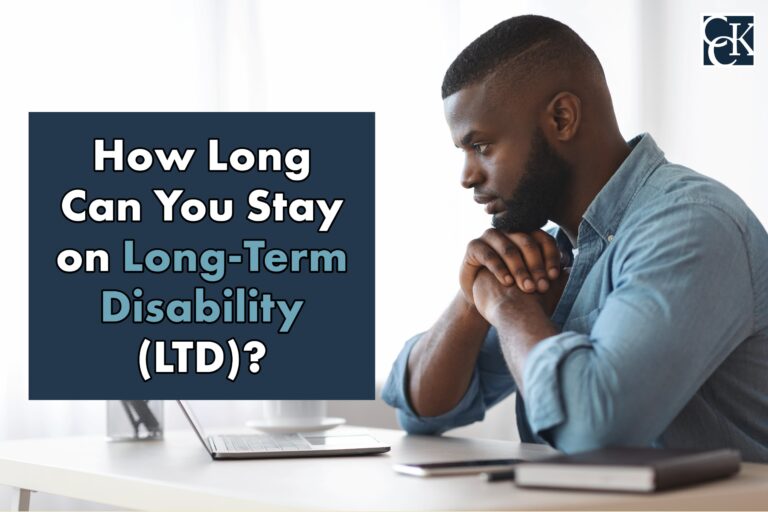How Long Can You Stay on Long-Term Disability (LTD)?

When you are unable to work due to a medical condition or injury, you may file for long-term disability (LTD) benefits. Long-term disability insurance benefits are meant to protect a percentage of your pre-disability earnings when you cannot work for an extended period. However, you may wonder how long you can receive these benefits.
There are several things that impact how long you can stay on claim and receive long-term disability benefits. This article will discuss a few of these things, including definitions of disability, benefit limitations, and the maximum benefit period. It is also important to read your long-term disability policy in order to understand your specific coverage, as these specific provisions can vary from one policy to another.
What LTD Claimants Should Know About the Definition of Disability
Generally, long-term disability benefits are “payable,” meaning you can stay on long-term disability as long as you remain disabled under the terms of your policy. Your long-term disability policy provides the definition of disability that you need to meet. The requirements of the definition of disability can vary from policy to policy and determining if you meet that definition can have many factors, so it is important to read your entire policy closely to determine how long you can stay on long-term disability.

When you initially stop working, most LTD policies will pay benefits if you are disabled from your own occupation. In order to be disabled from your own occupation, you typically must be unable to perform one or more of the material duties of the job you were doing at the time you became disabled. Generally, insurance companies will evaluate your ability to do your own occupation based on how that occupation is performed in the national economy and not how it is performed at your specific employer.
The definition of disability frequently changes after benefits have been payable for 24 to 48 months. At that time, the definition may change to an any occupation definition, which means you must be unable to perform one or more of the material duties of any job. Sometimes the any occupation definition of disability takes into account your age, training, experience, or pre-disability earnings — but not always. These definitions are often broad and vague; they provide insurance companies the opportunity to suggest that you could perform an occupation that you cannot.
Insurance companies frequently terminate benefits when the definition of disability changes from own occupation to any occupation. Insurance companies may terminate your benefits on grounds that you are able to do another occupation, even if you are not qualified for it or it would be an unreasonable expectation given your health, age, and experience. Responding to these termination letters can be challenging. You should contact an attorney if your benefits are terminated and you do not believe you can work in any occupation.
Can I Work While on Long-Term Disability?
Even if you regain the functional capacity to return to work to some degree, you may still qualify for reduced LTD benefits. This is typically called partial disability. Like the own occupation and any occupation definitions of disability, the exact definition of partial disability can vary from policy to policy.

Some policies require you to remain disabled from your own occupation but allow you to work in another occupation, while others will allow you to work in your own occupation as long as you have had a loss of income as a result of your disability.
Can My Long-Term Disability Benefits Be Limited Due to My Medical Condition?
Even if you continue to meet the definition of disability, LTD policies often contain limitations that restrict the amount of time for which benefits are payable. Frequently, these limitations are based on the type of medical condition that is disabling you. For example, many long-term disability policies limit benefits for mental health conditions to 12 to 24 months. Your policy may also have a non-verifiable symptom limitation. This typically means that after a certain number of months, you will no longer qualify for benefits if you are disabled due to subjectively reported conditions, like tinnitus or fatigue.
These are just some examples. You should read your long-term disability policy carefully to understand all the limitations it contains. These limitations can be frustrating and appear unfair. You should contact an attorney if your claim is being subjected to a limitation that you feel is not appropriate.
What is the Maximum Benefit Period for Long-Term Disability Benefits?
The length of time you can receive long-term disability benefits depends on the terms of your policy. Many LTD policies contain a maximum benefit period, which defines how long long-term disability benefits last.

The maximum benefit period can vary from policy to policy, so it is important to read your policy to determine how your policy defines it and thus how long your benefits will last. You should also keep in mind that some policies may use different language or terminology to describe the maximum benefit period, such as “maximum duration” or “maximum indemnity period.”
Common Maximum Benefit Periods for LTD Policies
Although maximum benefit periods can vary, there are some common ones. Many policies provide long-term disability benefits until age 65. Other policies offer benefits until your Social Security Normal Retirement Age (SSNRA). Your SSNRA depends on the year you were born.
Alternatively, some policies will specify the number of months for which benefits are payable according to your age at the time you become disabled. Finally, although it is rare, some policies even provide lifetime benefits.
How Do I Receive Benefits for the Maximum Benefit Period?
Typically, in order to receive benefits for the maximum benefit period, you must remain disabled under the terms of your policy. There are many factors in determining if you are disabled and entitled to benefits under the terms of your policy.
A good place to start is to locate the definition of disability in your policy. As long as you continue to meet the definition of disability under the terms of your policy, your benefits should continue. However, it is important to note that insurance companies often still monitor claimants receiving benefits. Such companies may request information, such as proof of continuing treatment, that proves you are still disabled per your policy’s definition.
Contact the Long-Term Disability Attorneys at Chisholm Chisholm & Kilpatrick
Insurance companies sometimes operate in their own financial interest and, consequently, deny claims. You should contact an attorney if you think the insurance company may terminate your benefits or if you have already been terminated but feel you are still disabled. The appeal process can be daunting. At Chisholm Chisholm & Kilpatrick, our team of experienced attorneys and professionals can help you stay on claim — or get back on claim and stay there.
Call CCK today at (800) 544-9144 for a free case evaluation at any point in the claim and appeal process. A member of our team will analyze your case and determine if we can assist you.
About the Author
Share this Post

